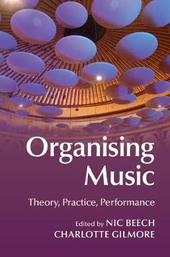
|
Organising Music: Theory, Practice, Performance
Hardback
Main Details
| Title |
Organising Music: Theory, Practice, Performance
|
| Authors and Contributors |
Edited by Nic Beech
|
|
Edited by Charlotte Gilmore
|
| Physical Properties |
| Format:Hardback | | Pages:446 | | Dimensions(mm): Height 237,Width 160 |
|
| Category/Genre | Theory of music and musicology
Organizational theory and behaviour |
|---|
| ISBN/Barcode |
9781107040953
|
| Classifications | Dewey:780.6 |
|---|
| Audience | | Professional & Vocational | |
|---|
| Illustrations |
2 Tables, black and white; 2 Halftones, unspecified; 2 Halftones, black and white
|
|
Publishing Details |
| Publisher |
Cambridge University Press
|
| Imprint |
Cambridge University Press
|
| Publication Date |
5 February 2015 |
| Publication Country |
United Kingdom
|
Description
Organisational theorists have become increasingly interested in the creative industries, where practices that are commonplace are of particular interest to organisations in other sectors as they look for new ways to enhance performance. Focusing on the music industry, this book sets up a unique dialogue between leading organisational theorists and music professionals. Part I explores links between organisation theory and the creative industries literature, concentrating on practices of organising and knowledge mobilisation, followed by an in-depth discussion of key theoretical concepts by subject experts. Part II provides a diverse range of 'tales from the field', including examples from classical orchestras, folk, indie and punk. The concluding chapter examines the shared dialogue to reveal what practice in the musical field can learn from organisational theory, and vice versa. This innovative book will interest graduate students and researchers in the fields of organisation studies, music management and the creative industries.
Author Biography
Nic Beech is Vice-Principal and Head of the College of Arts and Social Sciences at the University of Dundee and Chair of the British Academy of Management. His research interests are in management practice, change and the construction of identity in the music industry, health, financial services and creative industries. He has extensively published in the field of organisation studies and is the author of Managing Change (Cambridge, 2012) and Managing Creativity (Cambridge, 2009). Charlotte Gilmore is a Chancellor's Fellow at the University of Edinburgh Business School. Before taking up her position at Edinburgh, she was a Lecturer in Creative and Cultural Industries at the University of St Andrews. Her area of interest is the creative industries and her work has been published in Human Relations, Management Learning and the British Journal of Management.
Reviews'We have had the linguistic, reflexive, postmodern and practice turns, and we are now experiencing more of an exciting turn to explore what the language, organisation and practices of the arts can contribute to our understanding of organisational performance. This excellent book is a major contribution to this field, providing both a succinct and accessible contribution to the field of organisational studies, and case studies and reflections on what the field might learn from music and the music industry. I can thoroughly recommend it.' Richard J. Badham, Macquarie Graduate School of Management, Sydney 'Articulate and wonderfully knowledgeable, this book stimulates fresh thinking about music making and organization theory. Bringing together two fields apparently disconnected, it offers valuable insights to be drawn from essays written by contributors from a wide range of professional and academic specializations.' Silvia Gherardi, Universita di Trento 'This book is a must for all of us who are interested in organizations and music, but it also provides more general fundamental insights into the organizing structures, processes and performances in our lives and society at large. Great composition, orchestra and virtuosity.' Eero Vaara, Hanken School of Economics, Finland 'How the music industry plays to work has always fascinated management theorists. In this book, the free and easy open play of the music industry collides with organisational theory - to mutual benefit.' John Wallace, CBE, Former Principal of the Royal Conservatoire of Scotland
|